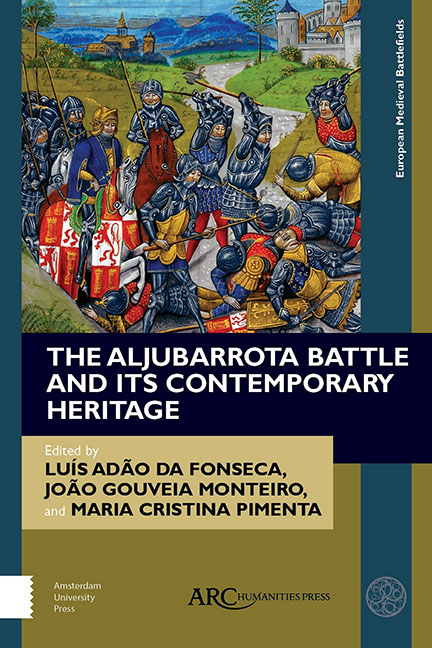Book contents
- Frontmatter
- Contents
- List of Illustrations
- Introduction
- Chapter 1 Before Aljubarrota
- Chapter 2 Fighting a Battle in the Middle Ages
- Chapter 3 The Decision to Fight at Aljubarrota
- Chapter 4 The Decisive Battle
- Chapter 5 Casualties and the Aftermath
- Chapter 6 Contemporary Memory and Myth-Making
- Chapter 7 The Legacy for Later Memories
- Chapter 8 The Battle of Aljubarrota Interpretation Centres
- Select Bibliography
- Index
Introduction
Published online by Cambridge University Press: 20 November 2020
- Frontmatter
- Contents
- List of Illustrations
- Introduction
- Chapter 1 Before Aljubarrota
- Chapter 2 Fighting a Battle in the Middle Ages
- Chapter 3 The Decision to Fight at Aljubarrota
- Chapter 4 The Decisive Battle
- Chapter 5 Casualties and the Aftermath
- Chapter 6 Contemporary Memory and Myth-Making
- Chapter 7 The Legacy for Later Memories
- Chapter 8 The Battle of Aljubarrota Interpretation Centres
- Select Bibliography
- Index
Summary
THIS IS THE first volume of a new collection devoted to European Medieval Battles. It includes battles representing different chronologies and geographies, many of them not yet widely known to the international medieval studies community or to a wider general public but often highly resonant within particular national or local contexts.
The aim of the series is to make more widely known European battles which may have had a strong national or regional importance, without them being or becoming a pan-European event. Battles are intrinsically related to the winning and losing side, and often the knowledge and importance of a battle stops at the periphery of the winners and losers, even if it originally had consequences beyond those. Often battles relate to or help define national identities thereby shaping Europe in the post-medieval world. English was chosen as language of choice for this series in order to reach out to the largest possible audience. All the volumes provide an overview of the political context of the event, a detailed description of the combat, its reflections in the collective memory of each nation, the relevance of the battlefield and the battle at the present time, stressing different experiences visitors are expected to have in order to bring them closer to the respective historical epoch.
The first volume is dedicated to the Battle of Aljubarrota, fought in central Portugal on August 14, 1385, between the newly elected King João I of Portugal and the Castilian monarch, Juan I of Trastâmara. In Portuguese history, this is viewed as the country's most celebrated battle, having profound consequences with regard to the ultimate configuration of the Iberian political world.
In the first chapter, we begin by embedding the conflict in the context of Iberian relations during the fourteenth century, integrating it into the macro European conflict of the Hundred Years’ War. Through a comparative analysis between the European setting and its Iberian reflections, particularly in Castile and Portugal, the aim is to lead the public to a better understanding of a complex process. We will show how the Battle of Aljubarrota, itself a decisive military and political moment, can be seen as the Iberian expression of the aforementioned late medieval Anglo-French conflict.
- Type
- Chapter
- Information
- Aljubarrota Battle and Its Contemporary Heritage , pp. ix - xPublisher: Amsterdam University PressPrint publication year: 2020



